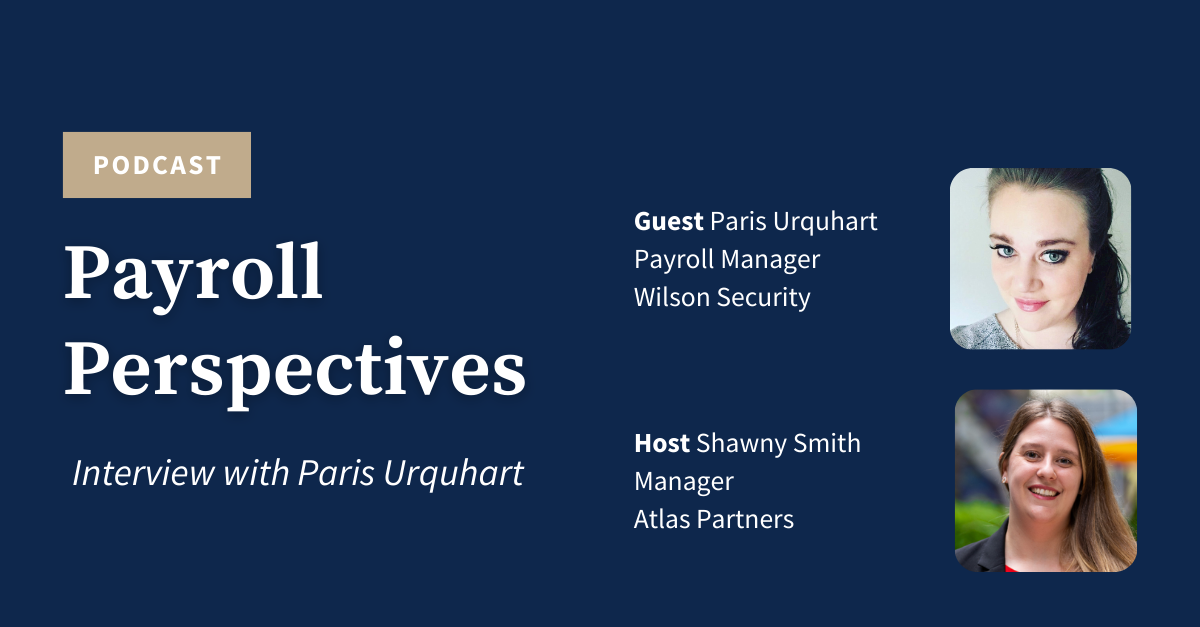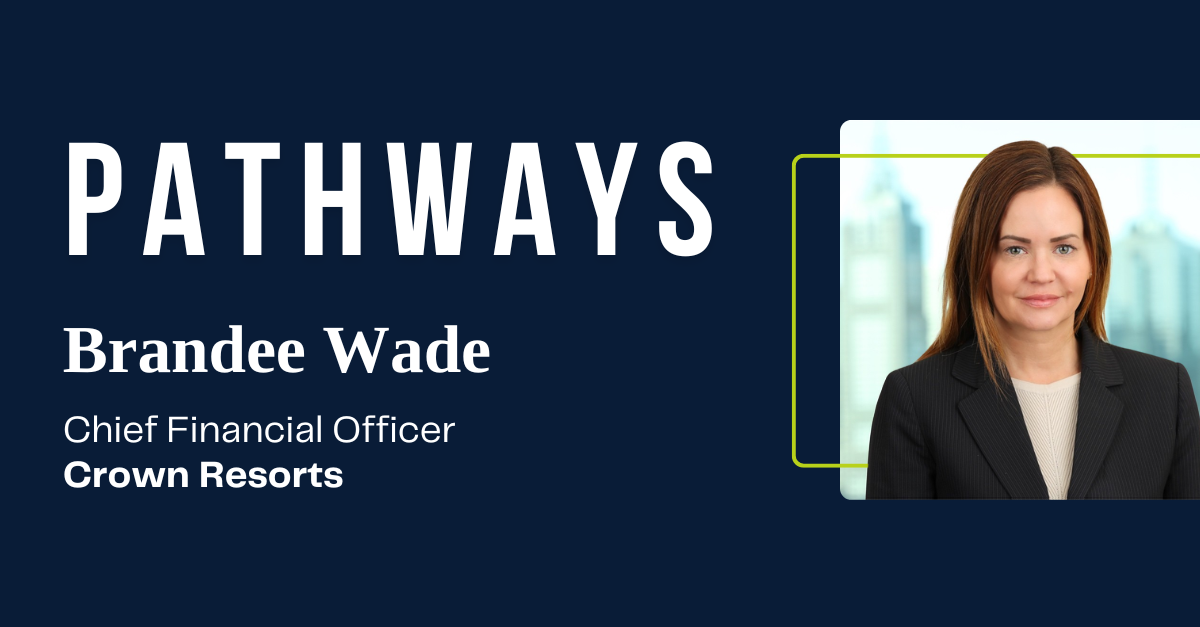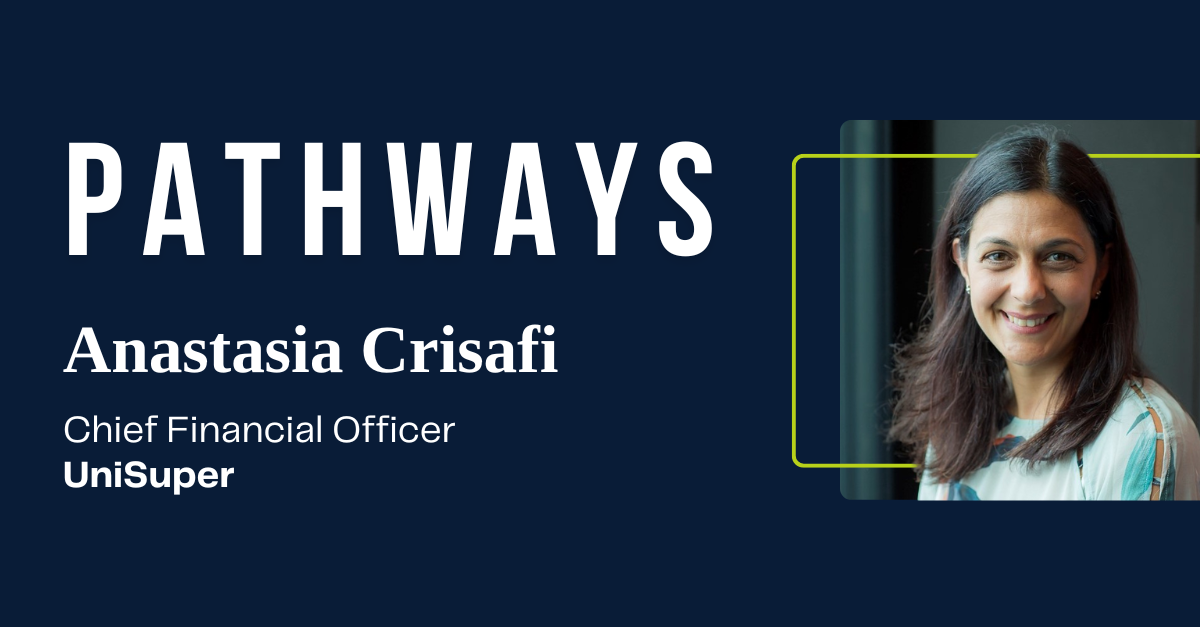
‘Falling’ into Payroll has been a lucky happenstance for Paris Urquhart — and it’s turned into almost two decades of luck, backed by hard work. Now the Payroll Manager for Wilson Security, Paris has built an appreciation and genuine passion for the career-choice that used to fly under the radar. She sat down with Shawny Smith, for Payroll Perspectives.
Shawny: Hi, Paris. Thanks for joining me for an episode of the Payroll perspective.
Paris: Thanks for having me.
Shawny: No problem. Hope you’re doing well today. Not too nervous? I know this is not on the top of everyone’s list.
Paris: No, it’s definitely not something I would be doing as a quite introverted person.
Shawny: Well, I’m glad you’ve come out of your shell to join me. But look, just to sort of start us off, why don’t you introduce yourself and give us a little bit of an overview on your career?
Paris: Yes. My name’s Paris. I’m currently the payroll manager for Wilson Security. I’ve been in payroll for approximately 16 years.
Shawny: Perfect. So since you were 19, so how did you actually get into payroll?
Paris: Sure. Like everybody says, fell into it. I started at the children’s hospital. I was going through a gap year. I was going to go back to uni the next year, go do teaching. So I got a job with royal children’s Hospital, being their admin desk person. Then from there, I just got an internship in payroll. And here we are. Once you’re in, you can’t get out.
Shawny: I know it’s one of those industries where you just sort of. There’s always something to learn, and it always sort of keeps you sort of in a chokehold, almost, you know?
Paris: Yes. I think what’s fun with payroll is it’s the best of both worlds. You’ve got enough HR in there that you’re talking to people, you’re helping people, but then you’ve got enough finance in there that you’re playing with numbers, you’re moving things around, that it’s really a happy place. I’m not stuck in one thing.
Shawny: No. It’s definitely a very interesting blended role, because you kind of need, you know, two different personalities. You know, you need that finance and that. That HR blend to create its own unique payroll personality.
Paris: Yeah, definitely.
Shawny: Perfect. And I noticed, too, that you spent almost nine years in an outsourced business. What was that like?
Paris: It was different. So the children’s hospital was outsourcing as well, but we were based at the hospital. So it was almost like you were employed by the children’s hospital and you had your friends there. I want to say approximately four to five years there. And then I moved into there. The company that I was working for, they had, like, a proper outsourcing business where we had, by the time I left, 120 clients that were running payrolls for in a small payroll team. That one there, like, it was good. I loved it. The experiences that I had there, I would never give back, even for the knowledge and the way that I work today, I don’t think I would have got that working for a company, but it is just so fast paced. You’ll be working on a client doing payroll, and then all of a sudden another client says something. You have to drop everything and switch your brain to this client and their needs and then switch back. The way you work for the outsourcing company is just so different to anything else.
Shawny: I love, too, that you had an experience in an outsourced model, but it was purely for a very large client where you were basically based there, but also on the flip side, where you had multiple different clients and you had that, I would say true outsource experience.
Paris: Yeah, yeah. And it was very much a true outsourcing where you hand them the checklist of what do you want the payroll function to be? And they tick what they want, and that’s what we do for them. So it could have been anywhere from they just want us to data punch their payroll to, they want us to do their end to end, including payroll tax. So it was, yeah, a wild ride. Wouldn’t give it back, but wouldn’t go back today if you asked me to. I’ve done my time.
Shawny: Yeah, no, I’ve definitely heard from a few different people that, you know, the experience that you get having to juggle multiple different clients, their needs, having that stakeholder engagement, but also just different industries and different types of payroll awards and all sorts that you need to deal with on a day to day basis instead of, you know, I worked for this business. It’s very different. So definitely some benefits if you enjoy that kind of fast paced nature. But I understand what you’re saying that you sort of enjoy that in house side of things now. But I suppose what you mentioned as well with the client would tell you what they need. I think a lot of people don’t quite understand the outsource model can be so many different ways and very customizable where, you know, you may be doing one piece of the puzzle for them or basically the full end to end. And I suppose that’s the benefit to the organization, where they can get some consulting or some outsourced help with just some elements or the full function.
Paris: But I think what people don’t realize with outsourcing as well, that you might be the outsourced payroll function, but the company might outsource to an outsourced company who then outsourced to you. Like you might be the fourth outsourcer in that production. So then you’ve got a question. You’re sending it to the outsourced company that’s working in different country. They’re going back to the client then. Like, there’s a whole process behind it as well. Like, it’s very, it’s just different where, like, working inside an organization, most things are almost instant. If I’ve got a question about where am I costing this to, I could go directly to the CFO and be like, what are we doing here? But outsourcing, it’s been two to three day turnaround. To get an answer.
Shawny: Yeah, I think for some people, you know, I’m not a patient person at all, so that would really drive me nuts. So I can understand why it’s not for everyone. But I actually didn’t realize that some businesses would be kind of like, through another third or fourth party. And it sort of does take that time for them to then pass on the information and get back to you.
Paris: Yeah, yeah. Which is, yeah. Frustrating and a blessing at the same time. Like, yeah, it’s just, it’s all just so very different. It’s a different world to be a part of when you’re in that side of payroll.
Shawny: Definitely sounds like it. And I’ve recruited four different outsourced businesses and for in house, and again, it’s. You are kind of looking for different types of people and I suppose different points in their career as well, I think.
Paris: Yeah, I think what else I really appreciated about my outsourcing career was it wasn’t for a direct company, like. Cause I know you’ve got like, your frontiers and they have their system. It was solely an outsourcing business. And then we used multiple payroll systems. So we eventually got them all onto a majority of them onto one. But we had, I think just in that I had six payroll systems that I had to know on top of being able to use. I think we had three different platforms for the client. Like, different clients to be able to get information from. There was at least two different outsourcing outsources that were contacting us. Like, there was just so much to know, which I really put forward to how I am, where I am today, because without all of that knowledge, I don’t think that I would have learned everything I know just being at an organization.
Shawny: Yeah, I feel like it’s a really good way for people to gain some really valuable experience with systems and different industries in a shorter period of time. Because it is something that if you’ve only worked with in house businesses, you know, you’re usually working for one system, maybe there’s a legacy system, but you’re sort of working with one thing at a time or one industry at a time. And the outsource is where you sort of get, yes, it’s a lot of work and a lot of brain power needed, but you’re sort of being tucked into the deep end with all sorts of information that you need to learn. So definitely a good breeding ground for.
Paris: Experience, definitely even implementation, because the amount, and again, it’s the outsourcing world, they flip and flop to different outsources all the time. So you’re running parallels, you’re learning how to do that side of things. We’re in an organization, you may never see that in your lifetime because they’ve just have their system and that’s what they use. You’ll never be able to do a parallel run. Or how do we merge all of this information from the old outsourcer into our new system.
Shawny: It’s great to hear, too. It still sounds like to this day that you, you know, really enjoyed it, even though you say you wouldn’t go back, you know, it’s still something that you think you know very highly of. So, look, the next question is a little bit of a pivot. Obviously, AI has been a pretty big topic in all industries, but what do you think the impact will be on payroll from a day to day perspective?
Paris: From day to day, I don’t know that AI would really touch payroll too much. There’s so much customer service behind payroll that AI just would never get even to award interpretation. The wording they use in the fair work, as we all know, is open to interpretation. So even putting that stuff into there, I just don’t think AI would be able to get it right all the time. There’s always going to have to be a human touch behind it. And working for organization, doing payroll, you know, your employees, you know, circumstances, you know, things are happening behind the scenes. There’s just things that AI couldn’t take into account to be able to be like, you know what, let’s just push this leave through. They don’t have the balance, but we’ve decided we’re going to let them have it because X is happening. AI just wouldn’t do it. It have hard, fast rules and that was that.
Shawny: That’s so true. The human element would be completely lost. And to create a, an AI where you could add all these, you know, what if rules or something like that would just make the system almost not work, you’d probably break it. And I think the other element, too is that I think people forget how long things take to change and it’s like one piece at a time. You know, AI has been around now. You know, I’ve been using it in my job for basically the whole year, and it’s definitely improved some things and others I still have to do quite a high level edit on when it comes to, you know, it helping me edit a post or something like that. You know, I’m not going to use the language that AI is going to use because it sounds like AI wrote it and not a person. But, yeah, I think we’re a long way away from it having a huge impact on. Yeah. Especially those interpretations and any human element, but hopefully it still will add value to people from an analytical point of view. Bouncing ideas off. Sometimes I kind of use it as my second brain, you know, to bounce ideas off and try and start building something out, but I never just purely use it. And I think that’s a lot of people’s perspective. You know, you, you can use it as a basis, but never as a full function.
Paris: Yeah, it’s just a tool to help you out from my point of view, like, I don’t think everyone should be sitting there scared that we’re all going to lose our jobs to robots. They’re not taking over the world, like.
Shawny: Not yet, maybe in 20 to 50 years. And honestly, I think, I think it’s actually a really positive sign. And I’ve been, you know, feeling very optimistic about the future of payroll and things that are happening even from five years ago. A lot has changed for the better. And I think even though there’s still a lot of burnout in the industry, we’re in a much better position than we were. And I can see it continuing that way. Sometimes it feels like one step forward, two steps back. But I do think that we’re sort of moving forward, which is good.
Paris: Oh, definitely. And I think organizations are realizing that as well. I think there’s a lot of realization that payroll’s quite an important function. Without payroll, you aren’t paying your staff, therefore people aren’t working.
Shawny: Like, yeah, no one’s going to come to work if you’re not paying them.
Paris: No. So I think there’s a lot of respect being put back into payroll to realize we really do need these teams and have their expertise to help us grow as a business as well.
Shawny: Definitely. And one of the last questions was around how the media has been betraying payroll and the historical areas that have been popping up and the back pays and all those sorts of things. I know we sort of briefly touched on it before this meeting that, you know, I feel like it’s helped and hindered in some ways. But what are your thoughts on how the media has been portraying payroll?
Paris: Oh, definitely. It’s scary, but also good that it’s bringing things to light at the same time because there’s a lot of things that just get looked over. We set it up back in 2000. Happy days. Like, you need to be on top of it constantly. You can’t just think, oh, set and forget. There’s no set and forget in payroll. You need to always be auditing. I think it’s also helped, again, bring back to the organizations realizing that payroll is an important function. Like, there’s training out there for payroll now. There’s no, like, you know, you go to HR, you have to have gone to uni and done a HR degree or same as finance. You may have to have done a finance degree, nothing like that, for payroll. But it’s starting to pop up now, and organizations are putting money into their people to go do a termination training. Go refresh yourself on long service leave, because that changes every other week. Like, they really are putting back to the people, which is nice. It’s nice to see. It’s a nice change from where I started, where, you know, you got your induction with the person who works there and they showed you how they do their things and that’s how you do it. Like, it’s really taking it back to know there are rules behind this.
Shawny: Exactly. And I think my only problem with, like, the media portrayal is that sometimes it is very blame the payroll team, where a lot of the issues come from resourcing and decisions from, you know, other senior leaders, directors, business owners. And I think that’s something that probably needs to be looked at in a little bit more detail, or the blame is kind of shared because I think it puts a lot of heat on some people that may have just started in the business a year ago and in process of rectifying the issues that have happened from years gone by that, again, still may not have come from purely payroll error or knowledge error. Could be from systems or, again, business decisions that didn’t quite go to plan.
Paris: Oh, 100%. I think people think I get payroll. They make all the decisions. We actually don’t. We can steer and say, I think you should really look at it from this angle. Or, you know, fair work says we do this, or Ato says we do that, but end of day, it’s your CFO’s, your managers, they’re the ones making the decision on what we actually put through the system. We’re not sitting there just doing what we’re told. We will push back when needed, but end of day, it’s not our final decision. We probably didn’t even do what was said or happened to cause the back pay.
Shawny: Yeah, and I think that’s something that’s really changing too, because payroll has been under the microscope and also the wage theft laws and those sorts of things. Payroll have been pushing back more and more, which I think has been a really good thing because businesses are struggling to get away with it now than what they used to. Which hopefully means in 510 years time, we’re not reviewing issues that are happening. Well, look, the last question is more around your team and how you go about hiring. I’ve noticed that your career, you’ve stuck around in most of your organizations for a really long time, more than most in payroll. You know, a lot of people can jump around. But is that something that you look for when hiring for your team? Is that tenure piece?
Paris: To a degree. When I’m hiring, the first thing I’m looking for is my team fit. That’s my number one biggest priority. My team here, it’s a very long standing team. We have very little turnover. The most turnover we get is someone goes on that leave. So yeah, that’s my biggest thing. I need to make sure the personality fits for both of us, the new hire and the team. Because again, it is a very strong personality team. Once I get past that, then it is very much looking at what sort of tenure have they had? What do they do? Are they jumping around because they’re just doing contract work or are they jumping around and they’re full time at every single place they’ve been at and why are they doing that? But it is a thought process when I am looking at people because I don’t want to, especially if I’m hiring for a full time permanent position. I don’t want to put my self through training, which as we all know takes a toll on you because you have to put all your work aside, train someone, do your work as well. Like it is a lot of work to put through someone and then have them leave in six months time. So it is very much something you like. I definitely look at when I am hiring, but its not the be all or end all either.
Shawny: Yeah, I think unfortunately its something that kind of is instilled in the payroll industry because it is so hard to find good people. And I suppose someone who has relevant industry knowledge or systems or, you know, something like that, which used to be the main reason you would hire someone is, you know, the system or industry. I think that means that we’ve had a lot of poaching, headhunting done and, you know, for a lot of people, you know, an extra 510k, you know, is life changing from a salary perspective. And they would sort of. Yep, you know, all right, let’s move on to this next opportunity. And obviously it’s not really helping their career if they’re not sticking around for longer than a year, because I do think that a lot of people assume if you’ve been there less than a year, what were you able to really understand, make changes on and impact in the role? Because I do think it takes that six to twelve months to fully understand a role, fully make an impact and start changing things. Especially because things in payroll, you know, can be a little bit slower. Yes, but I think, I hope that’s changing as well. I think there is definitely more people who possibly, again, because of COVID and the instability of the market, kind of stuck around in their businesses for a little bit longer. I hope that sort of changes and people can get sort of more key achievements out of each role.
Paris: Yeah, 100%. And you are right, like, you don’t really have a grasp on a company for the first six to twelve months. So, yeah, you really do need to stick around at least a minimum two years to be able to learn your systems, learn your people, and then start going, okay, how can I make a process better? How can I do something better? Even, like, have I really immersed myself into this company before I left? It is, yeah, yeah, it’s a hard one, but I also get it. Like burnout. I’ve had burnout. So I completely get it.
Shawny: And, you know, there’s plenty of other reasons why someone may move on again, payroll is so important and if the organization is, you know, opposed to change or things aren’t happening quite, quite right, or there’s cultural problems, you know, that’s also been a bit of an issue for people and needing to move on as well. But yeah, hopefully we can start seeing more of that tenure in the market because there is definitely, especially for the more junior candidates, you know, early in your career, you want to see a good chunk of, you know, time spent in one organization. Obviously for those sort of mid to late career, they might be doing contracts where they go in, you know, do some systems compliance changes. You know, they’re still making an impact because they know they know the job. But for those more junior candidates, you know, we want to see that you can stick around.
Paris: Yeah. I’d also like to see a lot more junior candidates come through. I’ve haven’t seen many. I know we just did a mat leaf cover and I was looking for something more junior that I could train up. It’s only going to be about 13 months, but at least get them out there because, you know, like I said, when I started my career, I was just doing a gap year until I started teaching. So teaching’s a big thing for me and I love to pass on all my knowledge, but I just don’t see the junior candidates anymore.
Shawny: Yeah, I honestly think that’s also an industry problem because for years, anyone hiring, even if it was for sort of, you know, parallel officer level, you know, that didn’t need a lot of experience, they were still, you know, one to two, maybe even three years that they were looking for or a key system or something that’s been used. There are definitely candidates out there that are doing sort of parallel courses and, you know, I think they reach out to me a lot as well. Cause they’re like, hey, you know, I’m trying to get into parallel. What’s your advice? So in that regard, you know, there is people out there, but it’s a little bit harder just because in the last few years, there hasn’t been a lot of that sort of training opportunities and to get people in, it’s all been about that experience and trying to deal with compliance issue systems and all those sorts of things.
Paris: Yeah. So hopefully there’s the shift there because we definitely need some young bloods coming through. Payroll, 100%.
Shawny: Payroll’s where it’s at. So get into the career. We’re selling it. Awesome. Well, look, that. That’s all the questions that we have for now and look really huge. Thank you from me for taking the time out of your day. I know it’s a very busy time of year for a lot of people, but it’s been wonderful to hear your perspective on Perron.
Paris: Thanks for having me. It’s been fun.
Shawny: Right? No need to be nervous.
Paris: No, it’s actually just a chat. It’s fine.
Shawny: Exactly. And we’ve known each other for a little while now, so hopefully that made it better.




